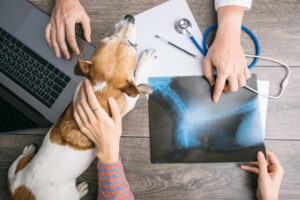
While orthopedic issues are something you never want your dog to experience, there are several common problems that you should be aware of.
It is a terrible feeling seeing your furry companion in pain. While orthopedic issues are something you never want your dog to experience, there are several common problems that you should be aware of. Knowing the causes and the symptoms to look for will allow you to take the necessary steps for treating your dog and helping them recover. Let’s go over some of the common orthopedic problems found in dogs.
Patellar Luxation
Also referred to as displacement of the patella, this is a common knee problem associated with smaller dog breeds. The patella, or kneecap, will slip out of position because the groove that holds the kneecap in place is shallower than in other breeds. Symptoms can include a lack of desire to run or jump onto things, an inability to bend the knee, skipping or hopping on 3 legs, and swelling of the affected area. Several surgical procedures can treat the condition, such as reinforcing the ligaments supporting the kneecap.
Cruciate Ligament Tears
Like humans, our dogs can strain and even tear tendons or ligaments. The Cranial Cruciate Ligament, or CCL, is the canine equivalent to the ACL in people, connecting the shin to the thigh bone to allow the proper movement of the knee. Overexercise, such as prolonged running and jumping, can cause a sudden tear of the CCL. This ligament can also gradually tear over time without resting to help a mildly injured ligament recover. If your pet continues to run and play with a damaged ligament, they will likely injure it further. A CCL tear must be surgically repaired to stabilize your pet’s knee joint, reduce tibial thrust, and allow them to move without pain.
Arthritis
One of the most common orthopedic issues in older adult dogs is arthritis. This is a painful, gradual deterioration of the joint caused by friction of bones rubbing against each other. There are many causes of arthritis, such as a past injury or improper alignment of the joint that caused the inflammation, leaving it unstable. If your dog has this condition, they may display symptoms like stiff joints, difficulty sitting down or getting up, trouble jumping and climbing stairs, lethargy, weight gain, and limping. Your veterinarian may recommend different methods to help your pet manage their condition, such as diet and exercise changes, joint supplements, orthopedic surgery, medications, and physical therapy.
Trust Maryland Veterinary Surgical Services With Your Companion’s Health
Your companion’s health is important, and the team at MVSS is ready to provide the best care possible for your furry family. We are dedicated to combining comprehensive exams and assessments with informative and honest discussions of your companion’s care. Once we have worked with you to decide on the best course of action for your dog, our professionals will use their surgical expertise to work towards the goal of giving your companion an active and pain-free life. We are proud to serve loyal companions in Catonsville and Baltimore. To learn more about our services, give us a call at 410-788-4088 or visit us online. For more information and tips for pet health, follow us on Facebook and Pinterest.
